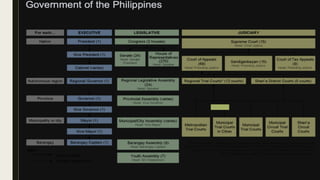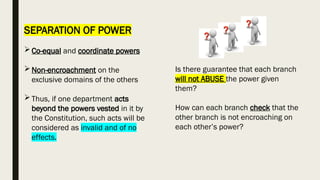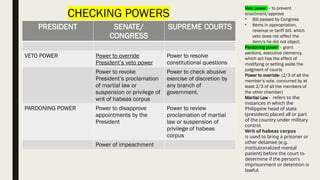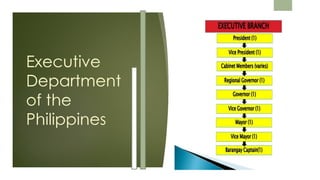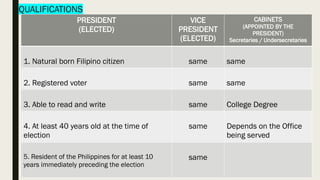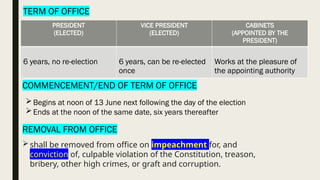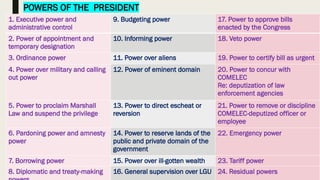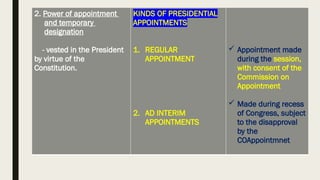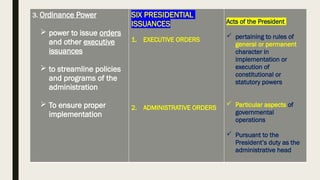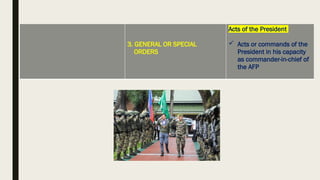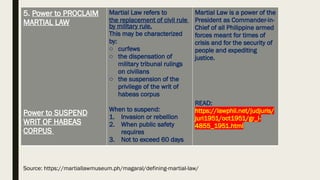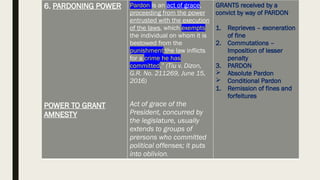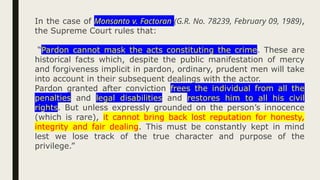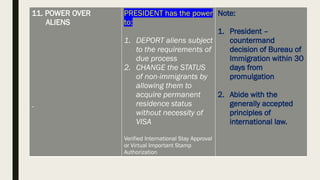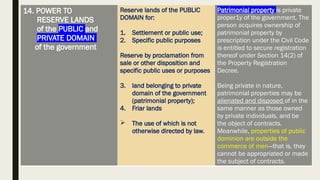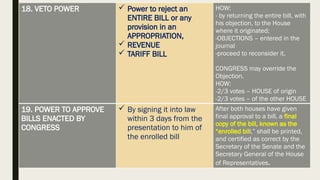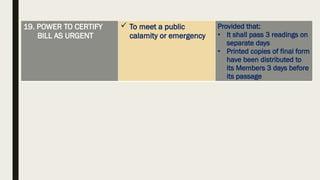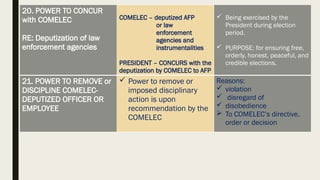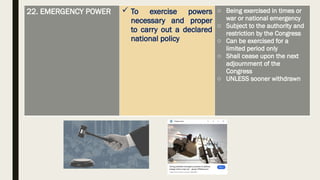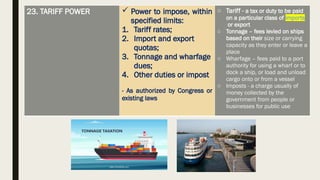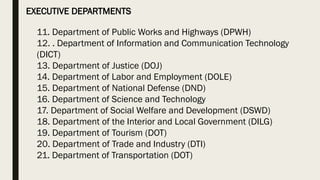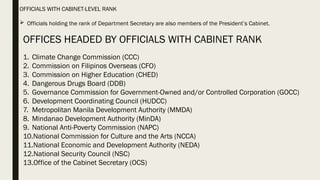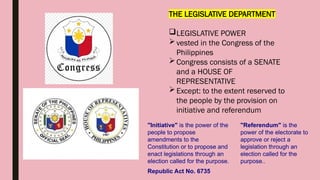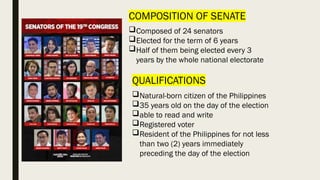SOURCES OF LAW (Legal Research and Writing)
- 1. SOURCES OF LAW LEGAL RESEARCH LECTURE BY SAPP Catherine E. Rutor-Reyes
- 2. THE PHILIPPINE GOVERNMENT What form of government does Philippine have?
- 3. The Philippines is a constitutional republi c with a presidential form of government wherein power is equally divided among its three branches: executive, legislative, and judicial. The Philippines is a democratic and republican state. Sovereignty resides in the people, and all government authority emanates from them. - 1987 Constitution - head of government, typically with the title of president, leads an executive branch that is separate from the legislative branch in systems that use separation of powers. This system was first introduced in the United States - A democratic country has a system of government where people have the power to participate in decision-making, i.e. choice of government officials to represent them. Republican state – -a country where power is held by the people or the representatives that they elect https://pcgsanfrancisco.org/the-government/; accessed on 9/5/2-24
- 4. Manifestations of a Democratic and Republican State (Sec. 1, Art. II) 1. The existence of a bill of rights; 2. The observance of the rule of majority; 3. The observance of the principle that ours is a government of laws, and not of men; 4. The presence of elections through popular will; 5. The observance of the principle of separation of powers and the system of checks and balances; 6. The observance of the principle that the legislature cannot pass irrepealable laws; 7. The observance of the law on public officers; and 8. The observance of the principle that the State cannot be sued without its consent. http://philgovernment.blogspot.com/2009/11/manifestations-of-democratic-and.html, accessed on 9/14/2024
- 5. Three Branches of the Government Legislativ e law-making branch Executiv e law-enforcing branch Judiciary law-interpreting branch
- 6. mm
- 7. HOW DOES THE THREE BRANCHES OF THE GOVERNMENT OPERATE?
- 8. SEPARATION OF POWER Co-equal and coordinate powers Non-encroachment on the exclusive domains of the others Thus, if one department acts beyond the powers vested in it by the Constitution, such acts will be considered as invalid and of no effects. Is there guarantee that each branch will not ABUSE the power given them? How can each branch check that the other branch is not encroaching on each other’s power?
- 9. CHECK AND BALANCE Each branch is given certain powers by the Constitution to “check” the powers of the other branches in order to balance the exercise of such powers and thus prevent and curtail possible abuses by any one of them. It is important aspect of the doctrine of separation of powers which serves to limit
- 10. PRESIDENT SENATE/ CONGRESS SUPREME COURTS VETO POWER Power to override President’s veto power Power to resolve constitutional questions Power to revoke President’s proclamation of martial law or suspension or privilege of writ of habeas corpus Power to check abusive exercise of discretion by any branch of government. PARDONING POWER Power to disapprove appointments by the President Power to review proclamation of martial law or suspension of privilege of habeas corpus Power of impeachment CHECKING POWERS Veto power – to prevent enactment/approve • Bill passed by Congress • Items in appropriation, revenue or tariff bill, which veto does not affect the item/s he did not object. Pardoning power – grant pardons, executive clemency, which act has the effect of modifying or setting aside the judgment of courts Power to override- (2/3 of all the member’s vote, concurred by at least 2/3 of all the members of the other chamber) Martial Law - refers to the instances in which the Philippine head of state (president) placed all or part of the country under military control. Writ of habeas corpus is used to bring a prisoner or other detainee (e.g. institutionalized mental patient) before the court to determine if the person's imprisonment or detention is lawful.
- 13. ❓ Who head the executive department? Officials? ❓ How do we elect our President and Vice President? ❓ How about the heads of the Cabinets, Department and Bureaus? Are they elected or appointed? ❓ What is the term of office of the President of the Philippines? ❓ When did the President of the Philippines start/end his term of office? ❓ Can we reelect our President / Vice President?
- 14. QUALIFICATIONS PRESIDENT (ELECTED) VICE PRESIDENT (ELECTED) CABINETS (APPOINTED BY THE PRESIDENT) Secretaries / Undersecretaries 1. Natural born Filipino citizen same same 2. Registered voter same same 3. Able to read and write same College Degree 4. At least 40 years old at the time of election same Depends on the Office being served 5. Resident of the Philippines for at least 10 years immediately preceding the election same
- 15. TERM OF OFFICE PRESIDENT (ELECTED) VICE PRESIDENT (ELECTED) CABINETS (APPOINTED BY THE PRESIDENT) 6 years, no re-election 6 years, can be re-elected once Works at the pleasure of the appointing authority COMMENCEMENT/END OF TERM OF OFFICE Begins at noon of 13 June next following the day of the election Ends at the noon of the same date, six years thereafter REMOVAL FROM OFFICE shall be removed from office on impeachment for, and conviction of, culpable violation of the Constitution, treason, bribery, other high crimes, or graft and corruption.
- 16. POWERS OF THE PRESIDENT 1. Executive power and administrative control 9. Budgeting power 17. Power to approve bills enacted by the Congress 2. Power of appointment and temporary designation 10. Informing power 18. Veto power 3. Ordinance power 11. Power over aliens 19. Power to certify bill as urgent 4. Power over military and calling out power 12. Power of eminent domain 20. Power to concur with COMELEC Re: deputization of law enforcement agencies 5. Power to proclaim Marshall Law and suspend the privilege 13. Power to direct escheat or reversion 21. Power to remove or discipline COMELEC-deputized officer or employee 6. Pardoning power and amnesty power 14. Power to reserve lands of the public and private domain of the government 22. Emergency power 7. Borrowing power 15. Power over ill-gotten wealth 23. Tariff power 8. Diplomatic and treaty-making 16. General supervision over LGU 24. Residual powers
- 17. POWERS OF THE PRESIDENT 1. Executive power and administrative control - President exercise control over all the departments, bureaus and offices - Ensure faithful execution of laws Source: Art. VII, Constitution Title: EXECUTIVE DEPARTMENT
- 18. 2. Power of appointment and temporary designation - vested in the President by virtue of the Constitution. KINDS OF PRESIDENTIAL APPOINTMENTS 1. REGULAR APPOINTMENT 2. AD INTERIM APPOINTMENTS Appointment made during the session, with consent of the Commission on Appointment Made during recess of Congress, subject to the disapproval by the COAppointmnet
- 19. 3. NOT REQUIRING CONSENT/CONFIRMATION BY COAppointment 4. POWER TO TEMPORARY DESIGNATE AN OFFICER Appointments of all other officers of the government: a. Whose appointments are not otherwise provided by law; b. Whom he may be authorized by the law to appoint. Reason: There is vacancy caused by illness, absence or other cause of the regularly appointed officer Not exceeding 1 year Officer appointed to perform functions in the executive branch
- 20. 3. Ordinance Power power to issue orders and other executive issuances to streamline policies and programs of the administration To ensure proper implementation SIX PRESIDENTIAL ISSUANCES 1. EXECUTIVE ORDERS 2. ADMINISTRATIVE ORDERS Acts of the President pertaining to rules of general or permanent character in implementation or execution of constitutional or statutory powers Particular aspects of governmental operations Pursuant to the President’s duty as the administrative head
- 21. 3. MEMORANDUM ORDER 4. MEMORANDUM CIRCULARS Acts of the President pertaining on matters of administrative detail, or of subordinate or temporary interest, which only concern a particular officer or government office Pertains to internal administration directed to the attention of some or all the departments, agencies, bureaus, or offices of the government, for information or compliance.
- 22. 3. GENERAL OR SPECIAL ORDERS Acts of the President Acts or commands of the President in his capacity as commander-in-chief of the AFP
- 23. 4. Power over the military and calling out power • President is the COMMANDER-IN-CHIEF of ALL the Armed Forces of the Philippines • President may CALL OUT the AFP to prevent lawlessness, violence, invasion or rebellion whenever necessary
- 24. 5. Power to PROCLAIM MARTIAL LAW Power to SUSPEND WRIT OF HABEAS CORPUS Martial Law refers to the replacement of civil rule by military rule. This may be characterized by: o curfews o the dispensation of military tribunal rulings on civilians o the suspension of the privilege of the writ of habeas corpus When to suspend: 1. Invasion or rebellion 2. When public safety requires 3. Not to exceed 60 days Martial Law is a power of the President as Commander-in- Chief of all Philippine armed forces meant for times of crisis and for the security of people and expediting justice. READ: https://lawphil.net/judjuris/ juri1951/oct1951/gr_l- 4855_1951.html Source: https://martiallawmuseum.ph/magaral/defining-martial-law/
- 25. What Is a Writ of Habeas Corpus? A writ of habeas corpus is a court order. It demands that a public official (such as a warden) deliver an imprisoned person to the court and show good cause for their detention. The writ allows a prisoner to challenge the legality of their confinement. Habeas corpus has roots in English common law. It translates to "you should have the body" in Latin. Often, the court holds a hearing on the matter. The inmate and the government may present evidence during the hearing about whether a legal basis exists for jailing the person. The court may also issue and enforce subpoenas What Happens if a Court Grants a Writ of Habeas Corpus? • An immediate release from prison • A reduction of their sentence • An order halting illegal conditions of confinement • A declaration of rights The type of habeas relief granted depends on the evidence presented during the habeas hearing. SOURCE: https://www.findlaw.com/criminal/criminal-procedure/writ-of -habeas-corpus.html ; accessed on 9-15-2025
- 26. 6. PARDONING POWER POWER TO GRANT AMNESTY Pardon is an act of grace, proceeding from the power entrusted with the execution of the laws, which exempts the individual on whom it is bestowed from the punishment the law inflicts for a crime he has committed.” (Tiu v. Dizon, G.R. No. 211269, June 15, 2016) Act of grace of the President, concurred by the legislature, usually extends to groups of prersons who committed political offenses; it puts into oblivion. GRANTS received by a convict by way of PARDON 1. Reprieves – exoneration of fine 2. Commutations – Imposition of lesser penalty 3. PARDON Absolute Pardon Conditional Pardon 1. Remission of fines and forfeitures
- 27. In the case of Monsanto v. Factoran (G.R. No. 78239, February 09, 1989), the Supreme Court rules that: “Pardon cannot mask the acts constituting the crime. These are historical facts which, despite the public manifestation of mercy and forgiveness implicit in pardon, ordinary, prudent men will take into account in their subsequent dealings with the actor. Pardon granted after conviction frees the individual from all the penalties and legal disabilities and restores him to all his civil rights. But unless expressly grounded on the person’s innocence (which is rare), it cannot bring back lost reputation for honesty, integrity and fair dealing. This must be constantly kept in mind lest we lose track of the true character and purpose of the privilege.”
- 28. 7. BORROWING POWER President may contract FOREIGN LOANS on behalf of the Republic Requirements: 1. With the prior concurrence of the Monetary Board 2. Subject to such limitations as may be provided by the law; 3. Foreign loans obtained or guaranteed shall be made available to public (Sec. 2, Art. VII, 1987, Constitution)
- 29. 8. DIPLOMATIC AND TREATY-MAKING POWERS PRESIDENT, as chief architect of foreign policy The President has the sole authority to negotiate with respect to treaty-making. 1. Deal with foreign states and governments 2. Extend/ withhold recognition 3. Maintain diplomatic relations 4. Enter into treaties 5. Transact the business of foreign relations
- 30. 9. BUDGETING POWER PRESIDENT has the power to: Cause the preparation of a PROPOSED ANNUAL BUDGET for: Expenditures Sources of financing of the national government Budget Proposal o Shall be submitted to the Congress o Within 30 days from the opening of every regular session o Serves as basis for general appropriations bill o If passed by the Congress and approves by the President: GENERAL APPROPRIATION ACT for the fiscal year
- 32. 11. POWER OVER ALIENS PRESIDENT has the power to: 1. DEPORT aliens subject to the requirements of due process 2. CHANGE the STATUS of non-immigrants by allowing them to acquire permanent residence status without necessity of VISA Verified International Stay Approval or Virtual Important Stamp Authorization Note: 1. President – countermand decision of Bureau of Immigration within 30 days from promulgation 2. Abide with the generally accepted principles of international law.
- 33. 12. POWER OF EMINENT DOMAIN PRESIDENT has the power to: 1. DEPORT aliens subject to the requirements of due process 2. CHANGE the STATUS of non-immigrants by allowing them to acquire permanent residence status without necessity of VISA Verified International Stay Approval or Virtual Important Stamp Authorization Note: 1. President – countermand decision of Bureau of Immigration within 30 days from promulgation 2. Abide with the generally accepted principles of international law.
- 34. 13. POWER TO DIRECT ESCHEAT OR REVERSION PRESIDENT has the power to DIRECT the Solicitor General to institute ESCHEAT or REVERSION proceedings ALL LANDS Transferred Assigned To persons DISQUALIFIED under the CONSTITUTION to ACQUIRE LANDS Escheat is a proceeding, unlike that of succession or assignment, whereby the state, by virtue of its sovereignty, steps in and claims the real or personal property of a person who dies intestate leaving no heir. In the absence of a lawful owner, a property is claimed by the state to forestall an open “invitation to self- service by the first comers.”
- 35. 14. POWER TO RESERVE LANDS of the PUBLIC and PRIVATE DOMAIN of the government Reserve lands of the PUBLIC DOMAIN for: 1. Settlement or public use; 2. Specific public purposes Reserve by proclamation from sale or other disposition and specific public uses or purposes 3. land belonging to private domain of the government (patrimonial property); 4. Friar lands The use of which is not otherwise directed by law. Patrimonial property is private proper1y of the government. The person acquires ownership of patrimonial property by prescription under the Civil Code is entitled to secure registration thereof under Section 14(2) of the Property Registration Decree. Being private in nature, patrimonial properties may be alienated and disposed of in the same manner as those owned by private individuals, and be the object of contracts. Meanwhile, properties of public dominion are outside the commerce of men—that is, they cannot be appropriated or made the subject of contracts.
- 36. 15. POWER OVER ILL- GOTTEN WEALTH POWER to authorize the Solicitor General To institute proceedings Purpose: o to recover ill-gotten properties o Unlawfully acquired by Public officials Order sequestration Freezing of assets or accounts or any such power as authorized by the Constitution. Patrimonial property is private property of the government. The person acquires ownership of patrimonial property by prescription under the Civil Code is entitled to secure registration thereof under Section 14(2) of the Property Registration Decree. Being private in nature, patrimonial properties may be alienated and disposed of in the same manner as those owned by private individuals, and be the object of contracts. Meanwhile, properties of public dominion are outside the commerce of men—that is, they cannot be appropriated or made the subject of contracts.
- 37. 16. GENERAL SUPERVISION OVER LGU . 17. POWER TO APPROVE BILLS ENACTED BY CONGRESS By signing it into law within 3 days from the presentation to him of the enrolled bill After both houses have given final approval to a bill, a final copy of the bill, known as the “enrolled bill,” shall be printed, and certified as correct by the Secretary of the Senate and the Secretary General of the House of Representatives.
- 38. 18. VETO POWER Power to reject an ENTIRE BILL or any provision in an APPROPRIATION, REVENUE TARIFF BILL HOW: - by returning the entire bill, with his objection, to the House where it originated; -OBJECTIONS – entered in the journal -proceed to reconsider it. CONGRESS may override the Objection. HOW: -2/3 votes – HOUSE of origin -2/3 votes – of the other HOUSE 19. POWER TO APPROVE BILLS ENACTED BY CONGRESS By signing it into law within 3 days from the presentation to him of the enrolled bill After both houses have given final approval to a bill, a final copy of the bill, known as the “enrolled bill,” shall be printed, and certified as correct by the Secretary of the Senate and the Secretary General of the House of Representatives.
- 39. 19. POWER TO CERTIFY BILL AS URGENT To meet a public calamity or emergency Provided that: • It shall pass 3 readings on separate days • Printed copies of final form have been distributed to its Members 3 days before its passage
- 40. 20. POWER TO CONCUR with COMELEC RE: Deputization of law enforcement agencies COMELEC – deputized AFP or law enforcement agencies and instrumentalities PRESIDENT – CONCURS with the deputization by COMELEC to AFP Being exercised by the President during election period. PURPOSE: for ensuring free, orderly, honest, peaceful, and credible elections. 21. POWER TO REMOVE or DISCIPLINE COMELEC- DEPUTIZED OFFICER OR EMPLOYEE Power to remove or imposed disciplinary action is upon recommendation by the COMELEC Reasons: violation disregard of disobedience To COMELEC’s directive, order or decision
- 41. 22. EMERGENCY POWER To exercise powers necessary and proper to carry out a declared national policy o Being exercised in times or war or national emergency o Subject to the authority and restriction by the Congress o Can be exercised for a limited period only o Shall cease upon the next adjournment of the Congress o UNLESS sooner withdrawn
- 42. 23. TARIFF POWER Power to impose, within specified limits: 1. Tariff rates; 2. Import and export quotas; 3. Tonnage and wharfage dues; 4. Other duties or impost - As authorized by Congress or existing laws o Tariff - a tax or duty to be paid on a particular class of imports or export o Tonnage – fees levied on ships based on their size or carrying capacity as they enter or leave a place o Wharfage – fees paid to a port authority for using a wharf or to dock a ship, or load and unload cargo onto or from a vessel o Imposts - a charge usually of money collected by the government from people or businesses for public use
- 43. 24. RESIDUAL POWER Such other powers and functions VESTED in the President o which are provided for under th laws o which are NOT specifically enumerated in the Administrative Code of 1987 (EO 292) o which are NOT delegated by the President in accordance with the law o Residual power Power retained by a governmental authority after certain powers have been delegated to other authorities.
- 44. VICE PRESIDENT 2nd highest official, next to the President Has same qualifications, term of office, manner of election and removal from post as the President May run for re-election as Vice President May be appointed by the President as Cabinet member, which appointment requires NO confirmation from the Succeeds the President to serve the latter’s unexpired term
- 45. NOTE: Photo not updated Cabinet’s COMPOSITION: Secretaries of the various Departments Chairmen or Chiefs of other agencies and offices that are headed by the offices holding cabinet ranks
- 46. EXECUTIVE DEPARTMENTS 1.Department of Agrarian Reform (DAR) 2.Department of Agriculture (DA) 3.Department of Budget and Management (DBM) 4.Department of Education (DepEd) 5.Department of Energy (DOE) 6.Department of Environment and Natural Resources (DENR) 7. Department of Finance ( DOF) 8.Department of Foreign Affairs (DFA) 9.Department of Health (DOH) 10.Department of Human Settlements and Urban Development (DHSUD)
- 47. EXECUTIVE DEPARTMENTS 11. Department of Public Works and Highways (DPWH) 12. . Department of Information and Communication Technology (DICT) 13. Department of Justice (DOJ) 14. Department of Labor and Employment (DOLE) 15. Department of National Defense (DND) 16. Department of Science and Technology 17. Department of Social Welfare and Development (DSWD) 18. Department of the Interior and Local Government (DILG) 19. Department of Tourism (DOT) 20. Department of Trade and Industry (DTI) 21. Department of Transportation (DOT)
- 48. OFFICIALS WITH CABINET-LEVEL RANK Officials holding the rank of Department Secretary are also members of the President’s Cabinet. OFFICES HEADED BY OFFICIALS WITH CABINET RANK 1. Climate Change Commission (CCC) 2. Commission on Filipinos Overseas (CFO) 3. Commission on Higher Education (CHED) 4. Dangerous Drugs Board (DDB) 5. Governance Commission for Government-Owned and/or Controlled Corporation (GOCC) 6. Development Coordinating Council (HUDCC) 7. Metropolitan Manila Development Authority (MMDA) 8. Mindanao Development Authority (MinDA) 9. National Anti-Poverty Commission (NAPC) 10.National Commission for Culture and the Arts (NCCA) 11.National Economic and Development Authority (NEDA) 12.National Security Council (NSC) 13.Office of the Cabinet Secretary (OCS)
- 49. OFFICES HEADED BY OFFICIALS WITH CABINET RANK 14. Office of the Chief Presidential Legal Counsel (OCPLC) 15. Office of the Executive Secretary (OES) 16. Office of the Political Adviser (OPA) 17. Office of the Presidential Adviser on the Peace Process (OPAAPP) 18. Office of the Presidential Spokesperson (OPS) 19. Office of the Solicitor General (OSG) 20. Philippine Competition Commission (PCC) 21. Presidential Communications Operations Office (PCOO) 22. Presidential Legislative Liaison Office (PLLO) 23. Presidential Management Staff (PMS) 24. Technical Education and Skills Development Authority (TESDA) 25. Office of the Presidential Adviser on Overseas Filipino Workers (OPAOFWs) 26. Office of the Presidential Assistant for the Visayas (OPAV) 27. Office of the Special Assistant to the President (OSAP)
- 51. THE LEGISLATIVE DEPARTMENT LEGISLATIVE POWER vested in the Congress of the Philippines Congress consists of a SENATE and a HOUSE OF REPRESENTATIVE Except: to the extent reserved to the people by the provision on initiative and referendum "Referendum" is the power of the electorate to approve or reject a legislation through an election called for the purpose.. "Initiative" is the power of the people to propose amendments to the Constitution or to propose and enact legislations through an election called for the purpose. Republic Act No. 6735
- 52. LEGISLATIVE POWER Is essentially the authority under the Constitution to make laws and subsequently, when the need arises to alter and to repeal them.
- 53. COMPOSITION OF SENATE Composed of 24 senators Elected for the term of 6 years Half of them being elected every 3 years by the whole national electorate QUALIFICATIONS Natural-born citizen of the Philippines 35 years old on the day of the election able to read and write Registered voter Resident of the Philippines for not less than two (2) years immediately preceding the day of the election
- 54. COMPOSITION OF THE HOUSE OF REPRESENTATIVE Composed of 306 Congressmen Classified as either legislative district or party- list representative QUALIFICATIONS Natural-born citizen of the Philippines 25 years old on the day of the election able to read and write Registered voter in the legislative district in which he shall be elected Resident of the Philippines for not less than one (1) year immediately preceding the day of the election
- 55. QUALIFICATIONS Natural-born citizen of the Philippines able to read and write Registered voter in the legislative district in which he shall be elected Resident of the Philippines for not less than one (1) year immediately preceding the day of the election A bona fide member of the party or organization for at least 90 days preceding the day of the election, At least 25 years old on the day of the election For youth sector: At least 25 years old on the day of the election but not more than 30 years old
- 56. SENATORS HOUSE OF REPRESENTATIVES PARTY-LIST REPRESENTATIVES YOUTH SECTORAL REPRESENTATIVES 6 years 3 years 3 years 3 years Shall serve for not more than 2 consecutive terms Shall serve for not more than 3 consecutive terms Shall serve for not more than 3 consecutive terms Shall serve for not more than 2 consecutive terms NOTE: The term limit is observed by the party-list nominees or representatives, but not by the nominating party-list group.
- 57. GENERAL LEGISLATIVE POWERS Enact laws intended as a rule of conduct to govern the relation between individuals i.e. civil laws, commercial laws, criminal laws, etc. Pass several types of measures – bills, joint resolutions, concurrent resolutions, and simple resolutions Conduct hearings and consultation meetings in aid of legislation with the end goal of improving existing laws Conduct debates during the plenary session
- 58. HOW DOES A BILL BECOME A LAW?





